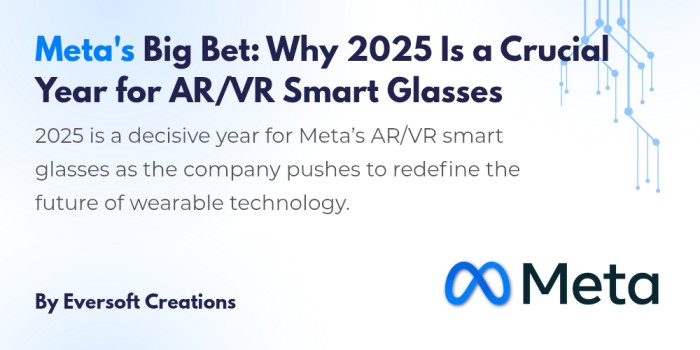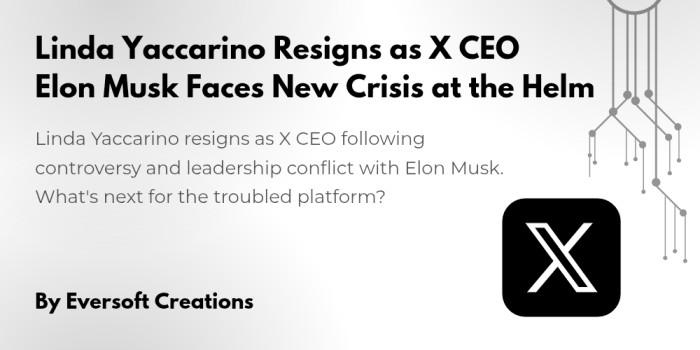Introduction
Many people in the tech world are eagerly watching Meta as it works hard to bring extended reality to the market. By 2025, the company’s most significant venture, AR/VR smart glasses, is likely to receive a lot of attention. With 2025 being described as ‘a pivotal year’ by Meta’s CTO, it is obvious that the future of wearable technology for Meta depends on how its AR/VR projects perform.
The term AR/VR smart glasses represents a device that stands for the arrival of a new age in computing. In what follows, we’ll explain why Meta is trying to guide this transformation, why the year 2025 matters a lot, and how this could change the digital world.
Meta’s Long-Term Vision: A Reality Built on Smart Glasses
For some time now, Meta has been working on bringing a digital metaverse to life. Meta became the company name in 2021, expressing Facebook’s intent to add virtual and augmented reality to our normal routine. The recent sales of Meta Quest and Ray-Ban Stories have made it possible for other AR/VR glasses to improve.
On the other hand, 2025 stands out from the rest of the forecasts. In Bosworth’s view, this year tells us the extent to which Meta’s vision can thrive. Bringing out new hardware is not enough; the main point is to highlight functions that matter to people and will be useful. The outcome of Meta’s smart glasses could help show whether the focus on Reality Labs was smart or not.
Why 2025 Matters More Than Ever
The year 2025 marks a significant position because of a number of key points.
Product Maturity
The previous versions of Meta’s smart glasses focused on the look rather than how it worked. However, the next generation coming with AI, voice recognition, translation, music identification, and possibly micro-displays, will be able to offer a lot more.
Market Competition
Samsung, Apple, and Google are starting to work in the AR/VR field, too. Google has connected with Gentle Monster and other brands in the fashion industry, whereas Apple is rumored to be building its very own smart glasses for 2026. It is necessary for Meta to increase its presence before the other companies take over the market.
Consumer Expectations
People are no longer easy to convince with visions of the future. They hope to learn things they can use right away. Meta should demonstrate that their AR/VR smart glasses make people’s work, interaction, entertainment, and ordinary life easier.
Financial Pressure
The company Meta has already invested more than $80 billion in Reality Labs since 2014. For the $20 billion expected to be invested in 2025, investors and analysts want to see proper results and clear progress.
Features That Make Meta’s Smart Glasses Stand Out
AI Integration
The glasses by Meta centralize on the use of AI. Ray-Ban Meta smart glasses now have AI built in to power real-time translation, object recognition, and ID of music all in real time.
Live-Streaming Capabilities
Direct live-streaming from glasses gives huge possibilities to content creators and social media influencers.
Voice Control
Using voice commands gives users more freedom while interacting with AR/VR.
Design and Comfort
Being aware of style and weight, Meta worked hard to create glasses that appeal to a wide population.
The Impact of AR/VR Smart Glasses on Everyday Life
The main benefit of AR/VR smart glasses is that they easily connect what is virtual and what is physical. Consider walking on the street and hearing about nearby restaurants or sitting in your house and joining online meetings face-to-face. They are not just future dreams but are included in Meta’s plans.
Such immersive experiences could revolutionize:
- Education: Learners could try out new historical journeys or do experiments with virtual objects.
- Healthcare: AR could help doctors by displaying needed information during surgery or training activities.
- Retail: Consumers could see a particular item in their room before deciding to buy it.
- Navigation: With GPS overlays, there would be no more getting lost during your travels.
Challenges Meta Must Overcome in 2025
Despite the promise, Meta faces several hurdles:
- Privacy Concerns: Smart glasses that have video/audio recording or streaming capabilities cause many ethical and legal concerns.
- Battery Life: If a smartphone is to have many powerful features, its battery capacity is reduced.
- Affordability: Price can sometimes stop most people from using the latest technology, since its price is often not cheap.
- App Ecosystem: Even the best technology will fail to attract consumers if there aren’t a lot of helpful apps available.
Meta’s Competitive Advantage
Besides relying on technology, Meta also puts its faith in brand, its infrastructure, and its scale. Taking advantage of the following resources allows the company to succeed.
- User Base: Since Meta has so many users across its different platforms, it will be easier to link its AR/VR smart glasses with social media.
- Developer Community: Illustrators have an early advantage in creating thrilling worlds when they use Horizon Worlds from Meta.
- Partnerships: Team-ups with Ray-Ban and similar icons make life simpler for both tech experts and regular people.
What the Future Holds Beyond 2025
Although much work needs to be done by 2025, it is also the first point on the way to bigger changes. The blueprint Meta has in mind is as follows:
- Advanced Display Tech: Future models are set to have bright microLED screens and better lenses for sharp and bright images.
- Gesture Recognition: Ways to interact by using hand gestures, moving the eyes, and brain-computer interfaces are explored.
- Lighter and Sleeker Models: Improvements in technology will bring about glasses that are more cozy and inconspicuous.
- More AI Functions: AI assistants in banking will provide guidance that is more suitable for each person and suggest actions in advance.
Conclusion: Is Meta Ready for the 2025 Challenge?
There is a good chance that Meta’s smart glasses initiative for AR/VR will be determined by what happens in 2025. Should Meta’s smart glasses become successful it would cement their leadership in the market and take them an important step forward in realizing their metaverse project. If the project fails, it might question the importance of the billions given to Reality Labs and the potential for AR/VR to become mainstays.
It is clear to many that Meta is being closely examined by people worldwide and needs to deliver results.
If you are interested in technology, code, or want to use new devices, 2025 is the year when you must keep your attention, perhaps using smart glasses.
Visit Eversoft Creations for more technology related updates.



